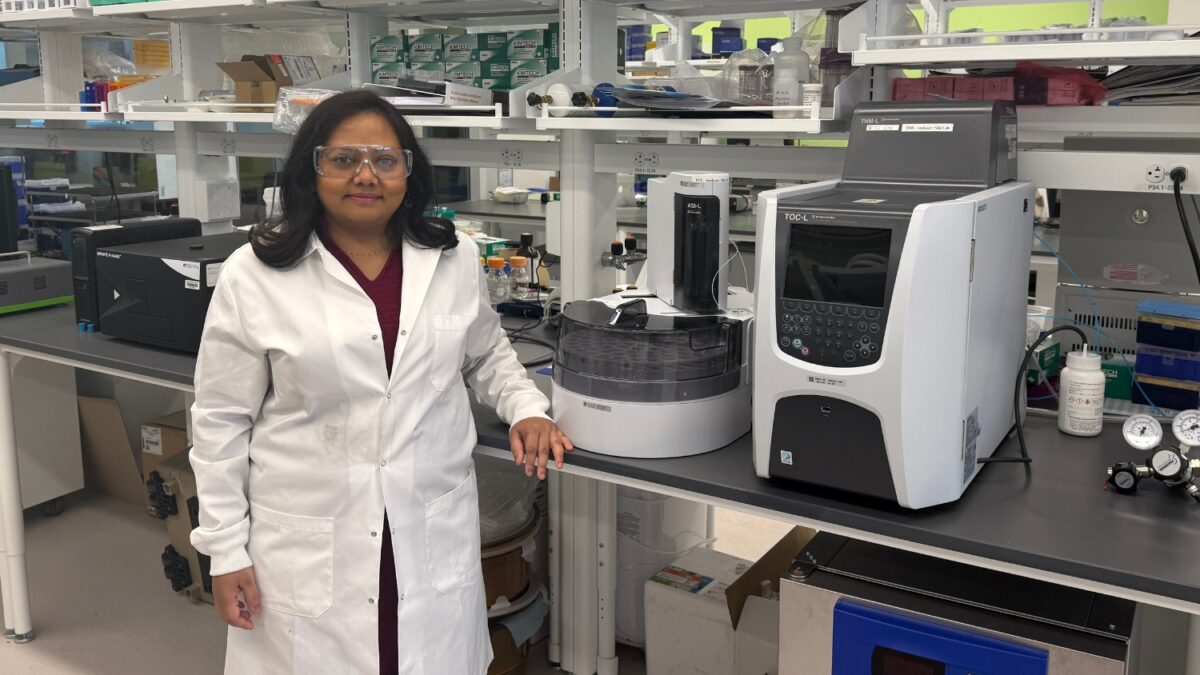Raleigh, North Carolina, USA
February 5, 2025

When agricultural challenges like sustainability and data-overwhelm intersect, innovation rarely happens in isolation. The most impactful solutions often emerge at the crossroads of disciplines, where technology and collaboration can collide.
For a fresh take on these opportunities, we welcome Debjani Sihi to North Carolina State University as an assistant professor, contributing expertise in biogeochemistry through a shared appointment between the Departments of Plant and Microbial Biology and Crop and Soil Sciences.
Journey to the Wolfpack
Before joining NC State, Sihi was a faculty member at Emory University, where she led research on soil carbon dynamics and mentored students in environmental sciences.
She earned a Ph.D. in soil and water science from the University of Florida, where she investigated soil organic matter dynamics and greenhouse gas emissions in subtropical wetlands. Her postdoctoral work at the University of Maryland Center for Environmental Science and Oak Ridge National Laboratory focused on biogeochemical modeling and soil greenhouse gas emissions.
“I’ve always been fascinated by how the tiniest interactions in soil can have monumental impacts on ecosystems and agriculture,” Sihi shared. “Integrating AI into this field opens doors we couldn’t have imagined a decade ago.”

Breaking New Ground with AI in Agriculture
Sihi’s appointment marks an exciting milestone for NC State as she becomes the first AI-focused cluster hire in the College of Agriculture and Life Sciences. Her interdisciplinary work bridges advanced data science with practical agricultural applications, positioning NC State at the forefront of AI-driven sustainability solutions.
“Effective use of AI in agriculture goes beyond a single study,” Sihi said. “I take a data-driven approach to understand the mechanisms and to create models that allow us to understand agriculture’s environmental footprint and the implications for food security.”
Studying Agriculture through Technology
At NC State, Dr. Sihi’s research will delve into the intricate interactions within the plant-soil-microbe-atmosphere continuum. Her work aims to:
- Integrate Advanced Technologies: Utilize sensors, imaging, and molecular tools to collect comprehensive data on soil and ecosystem processes.
- Employ Modeling Approaches: Apply machine learning and process-based models to predict productivity, greenhouse gas emissions and carbon and nutrient cycling under various environmental conditions and land management scenarios.
- Address Scalable Solutions: Focus on issues such as climate change mitigation, food security, and environmental sustainability through data-supported agricultural practices.
While her role is primarily foundational research, she values its connection to real-world outcomes.
“Agricultural land use is a complicated system that we can use AI to simplify – to learn patterns, predict outcomes and communicate what the practical benefits are. But it demands a lot of data, which is why basic research is essential. It fuels the field studies directly impacting farmers, policymakers and stakeholders.”
“We recommend practices like cover cropping, reduced tillage, soil amendments or a combination of these to reduce the environmental footprints of our agricultural systems, but we would like to discuss the outcomes confidently. Do the practices make a grower more profitable? Or how else do they benefit? Do these practices offer greater-good impacts like carbon sequestration and reduced greenhouse gases? Are these impacts permanent or temporary? We want the evidence to build sound decision and policymaking.”

The Data Challenge: Collaboration and Ethics in Agriculture
The proliferation of agricultural data instruments on farms and in research has created a significant but scattered data field. The challenge is to coordinate and skillfully combine the data locations and scales. She acknowledges that this is a tricky topic.
“We’re no longer data-limited,” Sihi said. “The limit now is data sharing and some ethical issues therein. So, it’s critical for us to communicate with stakeholders the value of public/private partnerships like the land grant system. The data could leapfrog our understanding years ahead.”
Engineering Sustainable Decisions
Looking ahead, Sihi is seeking partnerships within her cluster area, the N.C. PSI and other colleges within the university to create action-oriented work. She wants to evaluate management practices through multi-scale measurements that could have broad and possibly immediate applications.
She foresees a near future when algorithms can guide real-time decision-making.
“If we seek to reduce agriculture’s environmental footprint while maintaining yield, we must assess which variables provide the greatest benefit at the moment, including time, amendments, fertility and resources (like irrigation). Creating a reliable process model can drastically shorten farmer’s decision-making and satisfy multiple goals.”
Sihi confesses that she’s most excited about the opportunity to scale the groundwork already laid by colleagues and through platforms like the N.C. PSI and the Center for Environmental Farming Systems (CEFS).
“There’s a great opportunity to improve our understanding and mapping of plant and soil properties or ecosystem services in heterogeneous landscapes- from a bottom-up approach starting at the microbe and soil cores at the field level and top-down from satellite data to drone measurements. Growing datasets in both directions will create a pool we can tap and ultimately put in farmers’ hands.”
Want More Agricultural Innovation?
Crop and Soil Sciences’ research impacts farmers, students, and NC citizens. Follow how our discoveries affect agriculture and environmental science by joining our weekly newsfeed.
If you are a student interested in technology, climate mitigation or soil management, investigate our undergraduate and graduate degree programs, including a deep dive into our agronomy degree. Then, join us for a guided email tour of our department and university.
Protecting NC’s agriculture and environment through stewardship is just part of how we are growing the future.